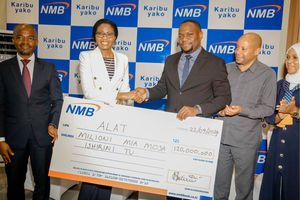Finally! Recognition for Kiswahili writers

More Kiswahili literature books are needed. PHOTOI FILE
What you need to know:
- Demere Kitunga, publisher and director of SOMA, a literary space that promotes readership in Dar says that it is comforting to see that both the initiator and the sponsor of the prize come from the East African region.
When told to think of Africa’s top three Prizes in literature many would not think of one that promotes Kiswahili. This, however, is slowly changing as more Prizes that promote the language emerge. Last November, English Professor at Cornell University in the US, Prof Mukoma wa Ngugi, announced The Mabati-Cornell Kiswahili Prize for African Literature. The prize is co-founded by Prof Mukoma and Lizzy Attree who is also a director at Caine Prize.
Demere Kitunga, publisher and director of SOMA, a literary space that promotes readership in Dar says that it is comforting to see that both the initiator and the sponsor of the prize come from the East African region. “For years we have belittled our language instead of taking Kiswahili as an asset. People say that we have ‘literature bareness’ but the truth is, we are the ones with the problem. We feel inferior about ourselves and our language. This must change,” she said.
In a statement issued on the Prize’s website, renowned author Ngugi Wa Thiong’o, also a board member, said that the prize seeks to inspire other similar initiatives that would promote writing in other African languages. He said that the Mabati-Cornell Prize is a major intervention in the struggle for writing in African languages, for their place and visibility in the global sun of literary imagination. “Prizes have generally been used to drown African Literature in African languages under a Europhone flood. With the Mabati-Cornell Prize the dreams of Diop, A.C. Jordan, Obi Wali and others are very much alive. I hope that this prize becomes an invitation for other African languages to do the same and much more.”
On the other hand, Neema Komba, co-founder of La Poetista, a poetry space in Dar says that a lot must be changed in order to groom and support literature in Kiswahili. It shouldn’t just be a top down initiative but also down up. “I went to Kifungiro Secondary School and St Anthony’s Secondary School. In both schools, it was prohibited for students to speak Kiswahili. There were few books in Kiswahili in the library. I found that my years in school tuned my mind to process ideas in English. I think in English, hence it is easier for me to write using it,” she said.
The market also demands more literature in English says Sandra Mushi, a renowned poet. Having worked with publishers in South Africa, it is easier to reach a wider audience when your work in English, she says. “Although, I do mix Kiswahili in my writing, I write in English. This is not because I cannot write in Kiswahili, it is just my personal preference.”
In Ms Demere’s views, this would hopefully change when a demand for writing in Kiswahili is created; something which prizes such as Mabati-Cornell seem to aim at achieving. Literary critic Lizzy Attree, who co-founded the prize with Wa Ngugi, noted in a statement issued in the prize’s website that while there exist international literary prizes for African writing such as the Caine Prize and the recently established Etisalat Prize, there are no major international and Pan-African literary prizes awarded to works produced in an African language. “The Mabati-Cornell Kiswahili Prize makes an important contribution to the body of world literature; the establishment of this new literary prize sets a precedent for other literature in African languages to follow.”
Its wide audience is something to commend, said Ms Demere. Entries are encouraged from all across Africa. “I am delighted that there will be an exchange of literature through this. We are used to works written in English being translated into Kiswahili, now we will see English being enriched by our language. It is something that needs to happen more often than it is now,” she said. In this way, our cultural heritage as Kiswahili speakers is growing The prize will be awarded to the best unpublished manuscripts or books in Kiswahili published within two years of the award year across the categories of fiction, poetry and memoir, and graphic novels. First prize winners receive Tsh 8.9m($5,000) in the categories of prose and poetry; second prize in any genre is Tsh 5.3m ($3,000) and third prize is Tsh 3.5m ($2,000). The winning entry will be published in Kiswahili by East African Educational Publishers (EAEP) and the best poetry book will be translated and published by the Africa Poetry Book Fund. Award ceremonies will be held at Cornell University, and in Kenya and Tanzania. The four prize winning writers will spend a week in residence at Cornell and a week at an additional partner institution.
Cornell English professor Mukoma Wa Ngugi, prize co-founder, said the prize recognizes that all languages are created equal and no one language should thrive at the expense of others. “But beyond that recognition, the prize sets an historical precedent for African philanthropy by Africans and shows that African philanthropy can and should be at the centre of African cultural production.”
Ms Demere resonates with these thoughts, saying that philanthropists in the region should follow the example.




